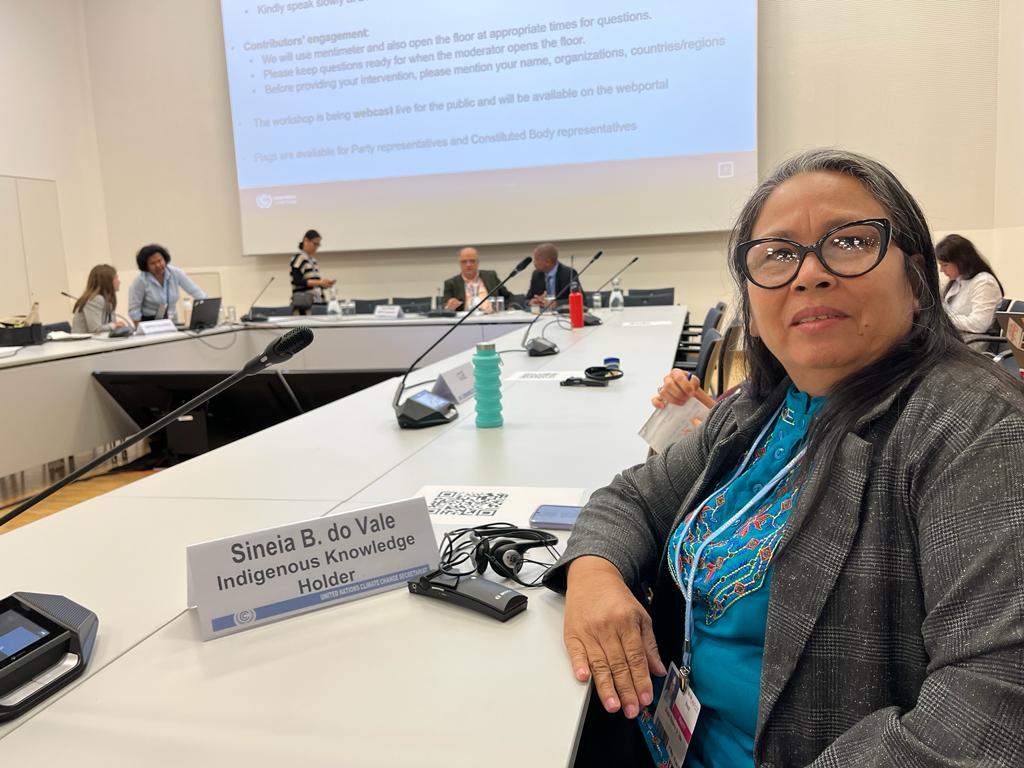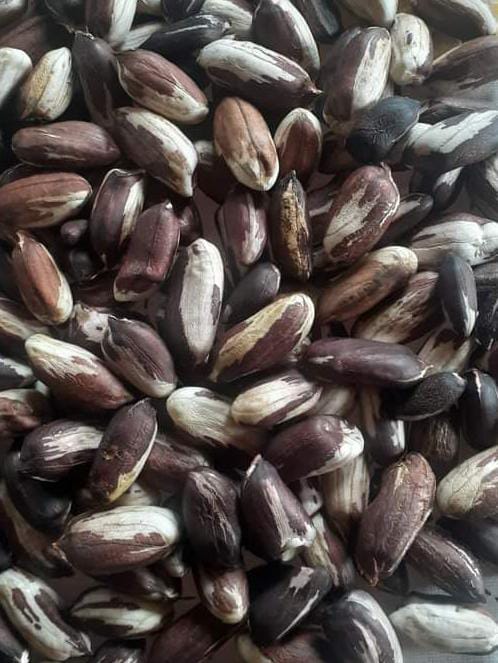International Recognition
For her first time as a panelist in an official activity of the Platform of Local Communities and Indigenous Peoples of the UNFCCC, Sineia Wapichana spoke on the pioneering nature of case studies on climate change in Roraima Indigenous lands.
Andreia Fanzeres/OPAN
The Local Communities and Indigenous Peoples Platform’s (LCIPP) Facilitative Working Group met nine times before an Indigenous representative from Brazil was invited to share her insights on and experiences with addressing climate change. Sineia Wapichana, from the Indigenous Council of Roraima (CIR), made history in Bonn, Germany, in 2023, a city she knows all too well. She has followed this agenda for nearly a decade at the United Nations Framework Convention on Climate Change (UNFCCC) headquarters. Then, every year, she makes the arduous journey back to the communities, working locally on what is sought to be achieved globally.

The invitation to participate as a bearer of Indigenous knowledge in the Training Workshop for Parties and Constituted Bodies of the Climate Convention was a direct consequence of the information provided by the Brazilian delegation on the Indigenous influence in the development of Brazil’s National Adaptation Plan.
On June 1st, Sineia reported to platform members and observers on the climate change case studies in Roraima prepared ten years ago in just three minutes, the time she was allotted at the 9th Meeting of the Facilitative Working Group (FWG 9). Compounded with the Brazilian Indigenous peoples’ participation efforts in the Climate Convention instances in recent years, Sineia’s contribution was considered so relevant that she finally received a proposal to explain in more time and detail the local work that she develops in the CIR’s Departamento de Gestão Ambiental e Territorial (Department of Environmental and Territorial Management).
Thus, on June 7th, Sineia gave a slide presentation during one of the two official platform activities at the SB58 Conference, which sets the stage for COP28. In the words of the Platform Secretariat, that presentation “gave real-life examples” of the preparation process for the Indigenous peoples’ contributions to climate policies and actions.
We, Indigenous peoples, are the first to feel the impacts of what is the transformation of climate for us. That has driven us to work in our region to show how we can mount our plans to address climate change to contribute to public policies in Brazil and set an example for other countries,” explained Sineia. She was referring to “AmazadPana’adinhan: percepções das comunidades indígenas sobre as mudanças climáticas – Região Serra da Lua/RR” (Portuguese for “AmazadPana’adidan: The Indigenous communities’ insights on climate change – Serra da Lua Region/RR”), a pioneering, still unique publication in the country, which was a reference for the Indigenous sub-chapter of Brazil’s 2016 National Adaptation Plan, an instrument of the National Policy on Climate Change (PNMC).

“To show how the climate transformations are affecting us, we conducted case studies to analyze our cultural life: fishing, hunting, and agriculture. Our studies found that the rivers had warmed up, and the regional fish had disappeared. The song of the birds that guided the harvests and plantings is no longer heard. How can we have policies to address these problems? Our plans for tackling these problems include our holistic insight and the demands that must be reinforced with public resources to face climate change,” she stated.
From Roraima to Juruena and the Arctic
As Sineia illustrated, the women’s routine and work with children have been vital and reveal the priorities for adressing climate change. Therefore, the plans, the various local training sequences, and Sineia’s discussion initiatives on climate in Roraima pay them special attention.
Women’s action is taking the lead in several other situations inside and outside the country. Dineva Kayabi (of the Kawaiwete people) also observed the various interventions of Sineia and Indigenous people from across the globe in the Bonn climate discussions and offered more insight and examples of adaptations to the transformations in the climate that are now even easier to perceive. As Dineva tells it, the Kawaiwete from the Rio dos Peixes in Mato Grosso’s Juruena River Basin cultivate and utilize five types of peanuts. However, the Indigenous women haven’t been able to prepare chicha (a fermented beverage) or porridge since last year, directly affecting the children’s nutrition and family incomes. “A small fruit called ‘chimico’ grows in the forest during September. We use it as an indicator in our calendar. That’s the fruit that tells us it’s time to plant the peanuts. But the rain was delayed in 2022, and for the first time, we were unable to plant,” said Dineva. She said that the peanut seeds were stored in bottles and bags so they would not be lost, and this year, they are expected to finally germinate.

Indigenous traditional knowledge is a systematic way of thinking based on evidence, observations, and long-term intergenerational experiences. Lisa Koperqualuk (of the Inuit people) gave an emotional speech defending that aspect, emphasizing that you don’t need an Intergovernmental Panel on Climate Change (IPCC) or a Global Balance to know that the Arctic is changing. “Our vision of the future is rooted in the past. Indigenous science, a collective knowledge, holds many answers. There are thousands of years of observations. We named each part of the coastline, each corner of our lands. Naming our territory is a way of expressing our knowledge. This kind of observation allows us to innovate and thrive in the Arctic. We love our homeland,” she said. “We were talking about climate change before the scientists. And we Inuit want to share our knowledge. If we protect the Arctic, we protect the planet. We need to protect the land, the water, our ice. Climate action is respect for Indigenous rights,” continued Lisa.

Today, the UNFCCC recognizes that Indigenous peoples and local communities hold traditional values, worldly insights, and practices that contribute to the collective efforts in addressing climate change and building resilience. But their impact on local, national, and international climate policies is still hardly known or visible. “With very few exceptions, we can say that Indigenous peoples are invisible bearers of rights and knowledge. We are represented as victims, as we are affected and benefited by projects. But that perspective is shortsighted, and it needs to be changed,” said Lakpa Nuri Sherpa, one of the authors of a 2022 study that analyzed the climate goals of ten Asian countries.
During the presentation at a side event of the results of a study developed by the Asia Indigenous Peoples Pact (AIPP), which covers 14 countries, Sherpa also emphasized the systematic discrimination of Indigenous peoples when it comes to involving them in discussions and climate policies and the importance of that work in the communities. “The term ‘climate change’ does not exist in most Indigenous languages. It’s hard to explain. Our studies are imperative for discussions in spaces like this, but they must also be useful for the communities. The national- and local-level actions are vital. We have to be there,” Sherpa stressed, aligning with and reinforcing Sineia Wapichana’s history of struggle and persistence in Roraima.
“We must secure the Indigenous peoples’ rights and combine our knowledge with the scientific knowledge to get more insights and find ways to reduce global warming. Indigenous peoples have been contributing their knowledge all over the world. And I brought this experience to say that it is possible,” ended Sineia Wapichana (much-applauded).

The Brazilian Indigenous delegation at SB58 in Bonn was supported by the Amazonian Cooperation Network (RCA), Operação Amazônia Nativa (OPAN), and the Amazon Environmental Research Institute (IPAM).
Click here to watch the presentation by Sineia Wapichana and the other guests at the Training Workshop for Parties and Constituted Bodies of the Climate Convention in Bonn, Germany (June 7, 2023).
